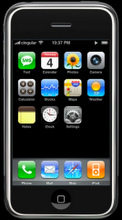An entire cottage industry has grown up to convince you that iPhone will fail. I can assure you that there is no possible way that iPhone can fail, even if it's a flop, in the way that Windows Mobile has failed.
The Missing Browsers
The cell phone market and the "smart phone" segment of that market in particular have been extremely successful at delivering phones that have web browsers built in, and selling those devices to prospective users. It has utterly failed to convince those same people, who pay hundreds of dollars for these phones, and hundreds of dollars per year for data service plans, to actually use their cell phone to access the internet.
This chart shows the browser market share, broken out by specific browser version.
Market Share for Web Browsers (by Browser Version)

You can see on that chart that Opera Mini and Pocket Internet Explorer, for example, have a tiny, almost imperceptible market share, around 1/10 of 1% each. An old version of Safari that hardly anybody uses has about seven times the market share of any cell phone browser. This is a curious fact, considering the recent announcement that 100 million phones running the most advanced Symbian operating system have been sold to consumers, and many tens of millions of phones running various versions of Windows CE/PocketPC/Mobile have been sold.
Beyond a doubt, many many millions more cell phones have been equipped with those browsers than there exist Macintosh computers with the old version of Safari installed, probably at least five or ten times as many.
Cell phone browsers should easily account for several percentage points of the browser market by now, three, five, or even nearly ten percent. Where are the missing browsers? Clearly people don't use the browsers on their cell phones.
Why People Don't Use the Web on Their Existing Phone
If you ask people, these are the reasons you hear about why they don't use the browser in their phone:
- The interface on the phone is so poor that the user doesn't realize it has a web browser.
- The interface on the phone is poor, and the browser is "too hard to use, it's not worth it".
- The screen is too small, it's too hard to read.
- The browser is too slow.
- The network is too slow.
- It's too hard to use for the few things that I want to do from the phone (getting directions with MapQuest or GoogleMaps, looking up phone numbers, checking stock prices). I can just wait and use my laptop for everything else.
There are undoubtedly other reasons, but these are the big ones.
Why people will use the web on iPhone
iPhone is poised to change that. It provides several things that other web-enabled phones don't provide.
- a large (3.5 inch), high resolution (320 x 480), high density (160 pixels per inch) screen, in other words, a sharp, readable image (see: iPhone technical specifications)
- an interface that is so easy to use, your Mom can learn to drive it by watching a television commercial (see: Watered Down
- seamless, automatic switching to WiFi where available, for high performance (Don't believe it? It's been working for years on Mac OS X)
- EDGE for wide coverage (albeit slow "2.5 G" network performance)
- synchronization of bookmarks with your PC
- a high performance hardware platform fully exploitable by a finely tuned operating system
(OS X provides SMP (symmetric multiprocessing) which allows it to exploit dual core ARM processors either now or in the future if needed, and it has built-in support for certain asynchronous multiprocessing capabilities, like offloading tasks to a GPU (graphics processor) or H.264 video encoder/decoder chip, which allow Apple's iPhone engineers to take advantage of hardware architectures not easily exploitable by other systems, for example)
With the major issues dramatically improved or solved outright by iPhone, you will see something you haven't seen before, which is people actually using web services from their phone. The way you see text messaging today, you'll see web services tomorrow, in airports, in bars, out shopping, out hiking in the park, pretty much everywhere.
Sure, in some cases it's a custom application accessing those services. However, don't let that distract, in fact it's part of the lesson. iPhone provides a couple new ways to use web services from the device, and they'll all add up to an impact on the web that no other phone has ever had. It's possible that the custom apps on the iPhone, like the Google Maps & YouTube viewers and the weather and stock price widgets, might even identify as Safari or WebKit, since they use the WebKit to render web content on the phone, even though Safari isn't used to directly access the web services. This would also have the side benefit of helping iPhone show more prominently in the web browser market share statistics.
What if iPhone really is a flop?
So suppose iPhone is a bust. Suppose it falls utterly flat in the market. Suppose only the handful of die-hard Macintosh geeks buy them, and the legion iPod users keep on buying plain jane cell phones and ordinary iPods without a cell phone built in?
Well, if the most pessimistic of pundits has their fantasy come true, then iPhone will still sell several million units between now and this time next year. Inertia will guarantee that.
iPhone, in the absolute worst case scenario cannot possibly fail to rise, almost overnight, to the top of the charts for cell phone based web browsers. If it sells only half of Apple's announced goal (10 million units by December 2008), it would be a disaster for Apple. The value of AAPL would fall by as much as a third when people realized the sales numbers were coming in lower than expected.
If only half of those users actually use their browser, iPhone will become, overnight, the dominant cell phone browser platform, with a market share several times that of other phone based browsers, combined. This will happen no matter how bad of a flop iPhone turns out to be, and it won't be a flop.
And that will bring a revolution to the industry. It will usher in the first mobile internet market, and Apple will dominate it, decisively.



No comments:
Post a Comment